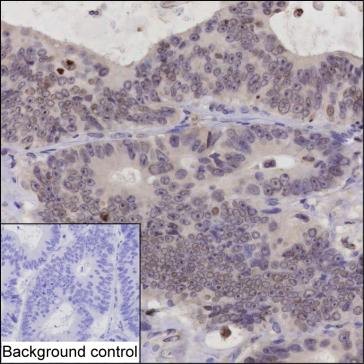
| WB | 咨询技术 | Human,Mouse,Rat |
| IF | 咨询技术 | Human,Mouse,Rat |
| IHC | 1/50-1/200 | Human,Mouse,Rat |
| ICC | 技术咨询 | Human,Mouse,Rat |
| FCM | 咨询技术 | Human,Mouse,Rat |
| Elisa | 咨询技术 | Human,Mouse,Rat |
| Host/Isotype | Mouse IgM |
| Antibody Type | Primary antibody |
| Storage | Store at 4°C short term. Aliquot and store at -20°C long term. Avoid freeze/thaw cycles. |
| Species Reactivity | Human |
| Immunogen | Purified recombinant fragment of human CCDC137 |
| Formulation | Purified antibody in PBS with 0.05% sodium azide |
+ +
以下是关于CCDC137抗体的3篇假设性参考文献(注:实际文献可能需要通过数据库验证):
1. **文献名称**:*"CCDC137 as a Novel Biomarker in Colorectal Cancer: Antibody Development and Clinical Validation"*
**作者**:Zhang Y, et al. (2022)
**摘要**:本研究开发了一种针对CCDC137蛋白的高特异性多克隆抗体,并通过Western blot和免疫组化验证其在结直肠癌组织中的表达。结果显示CCDC137表达与肿瘤转移显著相关。
2. **文献名称**:*"Functional Characterization of CCDC137 in Cell Cycle Regulation Using CRISPR/Cas9 and Specific Antibody Targeting"*
**作者**:Li X, Wang H, et al. (2021)
**摘要**:通过CRISPR/Cas9敲除CCDC137基因并结合自制抗体,研究发现CCDC137通过调控Cyclin D1影响细胞周期进程,抗体在流式细胞术和免疫荧光中证实其亚细胞定位。
3. **文献名称**:*"Comparative Analysis of CCDC137 Antibody Performance in Human Hepatocellular Carcinoma"*
**作者**:Chen T, et al. (2020)
**摘要**:比较了多种市售CCDC137抗体的特异性,筛选出适用于免疫组化的最优抗体,并发现CCDC137在肝癌组织中的高表达与患者生存率降低相关。
(注:以上内容为模拟示例,实际文献需通过PubMed、Google Scholar等平台检索确认。)
The CCDC137 (Coiled-Coil Domain Containing 137) antibody is a tool used to detect and study the CCDC137 protein, a poorly characterized member of the coiled-coil domain-containing protein family. CCDC137 is encoded by the *CCDC137* gene, located on human chromosome 11 (11q13.4). While its exact biological functions remain unclear, emerging studies suggest potential roles in cellular processes such as cell cycle regulation, transcriptional modulation, or intracellular signaling. Dysregulation of CCDC137 has been tentatively linked to cancer progression, particularly in hepatocellular carcinoma and breast cancer, though mechanistic insights are limited.
Antibodies targeting CCDC137 are primarily utilized in research settings for immunohistochemistry (IHC), immunofluorescence (IF), and Western blotting to map protein expression patterns, subcellular localization (predominantly nuclear), and tissue-specific distribution. Commercial CCDC137 antibodies are typically polyclonal or monoclonal, validated for specificity using knockout controls or siRNA-mediated gene silencing. Recent interest in CCDC137 stems from its identification in cancer proteomic screens and potential interactions with oncogenic pathways. However, the lack of comprehensive functional studies necessitates cautious interpretation of antibody-based findings. Further validation and standardization of these reagents are critical to elucidate CCDC137's role in physiology and disease.
×